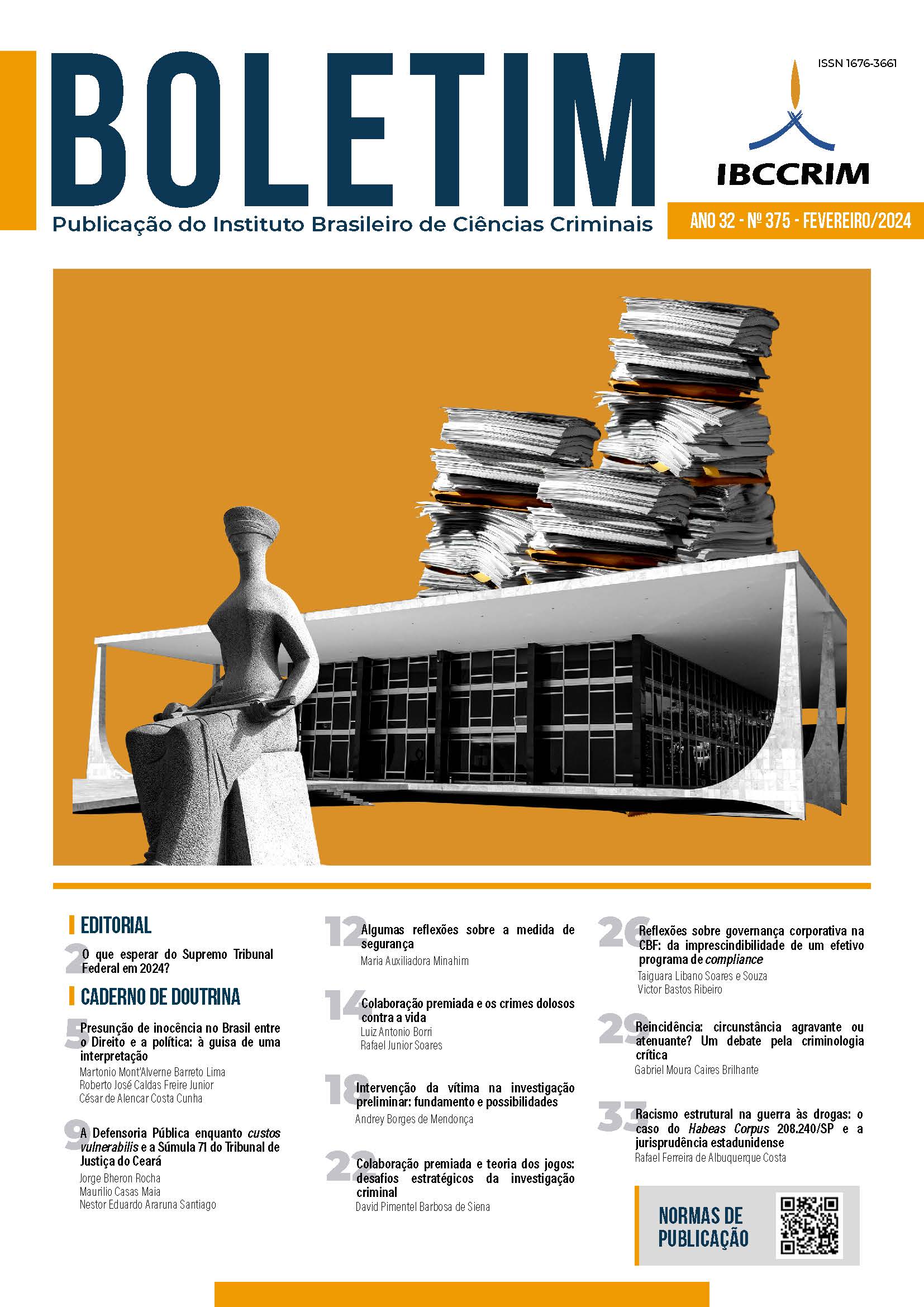Plea bargaining and intentional crimes against life
Views: 222DOI:
https://doi.org/10.5281/zenodo.10498641Keywords:
Penal agreements, Jury Court, ProcedureAbstract
The present work examines the difficult connection between plea bargaining and intentional crimes against life, taking into account the peculiarities of the special procedure that involves both the judge and lay judges. This structure results in procedural difficulties regarding the competence of approval, applicable awards, verification of effectiveness, among others. In this sense, we seek to answer the question of whether plea bargaining is applicable to intentional crimes against life and, if so, what are its legal limits. The deductive method was adopted, as well as bibliographic and documentary research, in order to demonstrate that plea bargaining result in adaptations of procedural rites, in order to allow the use of the means of obtaining evidence and, at the same time, preserve constitutional guarantees of the accused.
Downloads
Publication Facts
Reviewer profiles N/A
Author statements
- Academic society
- Instituto Brasileiro de Ciências Criminais
- Publisher
- IBCCRIM
References
BADARÓ, Gustavo. Art. 482. In: GOMES FILHO, Antonio Magalhães; TORON, Alberto Zacharias; BADARÓ, Gustavo (Orgs.) Código de Processo Penal Comentado. 2. ed. São Paulo: Thomson Reuters, 2019. p. 931-934.
BITTAR, Walter Barbosa; BORRI, Luiz Antonio; SOARES, Rafael Junior. A questão da natureza jurídica e a possibilidade legal de impugnação do acordo de colaboração premiada pelo delatado. BOLETIM DO IBCCRIM, v. 322, p. 19-21, 2019.
BRASIL. [Constituição (1988)]. Constituição da República Federativa do Brasil. Brasília, DF: Senado Federal, 1988. Disponível em: https://www.planalto.gov.br/ccivil_03/constituicao/constituicao.htm. Acesso em: 24 maio 2021.
BRASIL. Decreto-lei nº 3.689, de 3 de outubro de 1941. Código de Processo Penal. Rio de Janeiro: Presidência da República, 1941. Disponível em: https://www.planalto.gov.br/ccivil_03/decreto-lei/del3689.htm. Acesso em: 10 jan. 2024.BRASIL. Superior Tribunal de Justiça. Sexta Turma. HC 582.678/RJ, relatora Ministra Laurita Vaz, julgado em 14/6/2022, DJe de 21/6/2022.
BRASIL. Supremo Tribunal Federal. Tribunal Pleno. HC 166.373, Relator: Edson Fachin, Relator p/ Acórdão: Alexandre de Moraes, julgado em 30-11-2022.
COSTA, Klaus Negri; ARAÚJO, Fábio Roque; TÁVORA, Nestor. Curso de Legislação Criminal Especial. São Paulo: Juspodivm, 2022.
DE-LORENZI, Felipe da Costa. Justiça negociada e fundamentos do Direito Penal: pressupostos e limites materiais para os acordos sobre a sentença. São Paulo: Marcial Pons, 2020.
GOMES, Luiz Flávio; SILVA, Marcelo Rodrigues da. Organizações criminosas e técnicas especiais de investigação: Questões controvertidas, aspectos teóricos e práticos e análise da Lei 12.850/2013. Salvador: Juspodivm, 2015.
MARIELLE Franco: delação premiada feita por ex-PM muda rumo de investigação; entenda como funciona acordo. O Globo, 2 out. 2023. Disponível em: https://oglobo.globo.com/rio/noticia/2023/10/02/delacao-premiada-feita-por-ex-pm-muda-rumo-de-investigacao-do-caso-marielle-entenda-como-funciona-acordo.ghtml. Acesso em: 6 out. 2023.
MASSON, Cléber; MARÇAL, Vinícius. Crime Organizado [ebook]. 6. ed. Rio de Janeiro: Método, 2021.
MENDRONI, Marcelo Batlouni. Crimes organizado: aspectos gerais e mecanismos legais [ebook]. 7. ed. São Paulo: Atlas, 2020.
MORAES, Rodrigo Iennaco de. Colaboração premiada no Tribunal do Júri. Boletim do IBCCrim, São Paulo, v. 98, p. 7, 2001.
PONTE, Antonio Carlos da. Quesitação e soberania do júri. In: MADEIRA, Guilherme; BADARÓ, Gustavo; CRUZ, Rogério Schietti (Orgs.) Código de Processo Penal: Estudos comemorativos aos 80 anos de vigência. v. 2. São Paulo: Thomson Reuters, 2021. p. 477-490.
SANTOS, Marcos Paulo Dutra; SAMPAIO, Denis; SILVA, Rodrigo Faucz Pereira e; MUNIZ, Gina Ribeiro Gonçalves. Colaboração premiada no júri: da (im)possibilidade aos seus efeitos. Consultor Jurídico, 5 ago. 2023. Disponível em: https://www.conjur.com.br/2023-ago-05/tribunal-juri-colaboracao-premiada-juri-impossibilidade-aos-efeitos. Acesso em: 6 out. 2023.
SANTOS, Marcos Paulo Dutra; SAMPAIO, Denis; MUNIZ, Gina Ribeiro Gonçalves. Os efeitos da colaboração premiada no Tribunal do Júri (parte 2). Consultor Jurídico, 12 ago. 2023. Disponível em: em: https://www.conjur.com.br/2023-ago-12/tribunal-juri-efeitos-colaboracao-premiada-tribunal-juri-parte. Acesso em: 05 nov. 2023.
SANTOS, Marcos Paulo Dutra. Colaboração (delação) premiada. 4. ed. Salvador: Juspodivm, 2020.
SOARES, Rafael Junior; BITTAR, Walter Barbosa; BORRI, Luiz Antonio. Breves considerações sobre as nulidades inerentes aos acordos de colaboração premiada e os limites aos prêmios cabíveis no ordenamento jurídico a partir das modificações incluídas pela lei 13.964/19. Boletim do IBCCrim, São Paulo, v. 336, p. 24-25, 2020.
SUXBERGER, Antonio Henrique Graciano; CASELATO JUNIOR, Dalbertom. Efetividade e eficácia da colaboração premiada como chaves de compreensão para os limites da atuação judicial. Revista de Estudos Criminais, Porto Alegre, v. 18, n. 74, p. 221-240, 2019.
VALENTE, Victor Augusto Estevam; FINOTTI, Thamiris Rossato. Crimes dolosos contra a vida e a colaboração premiada no Tribunal do Júri. In: TORRICELLI, Marcelo Rodrigues da Silva; MANDARINO, Renan Posella; BROETO, Filipe Maia (Orgs.) Colaboração Premiada: Estudos em homenagem ao professor Luiz Flávio Gomes. Belo Horizonte/São Paulo: D'Plácido, 2021, p. 157-203.
VASCONCELLOS, Vinicius. Colaboração premiada no processo penal. 3. ed. São Paulo: RT, 2020.
Downloads
Published
How to Cite
Issue
Section
License
Copyright of published articles belongs to the author, but with journal rights over the first publication and respecting the one-year exclusivity period. Authors may only use the same results in other publications by clearly indicating this journal as the medium of the original publication. If there is no such indication, it will be considered a situation of self-plagiarism.
Therefore, the reproduction, total or partial, of the articles published here is subject to the express mention of the origin of its publication in this journal, citing the volume and number of this publication. For legal purposes, the source of the original publication must be consigned, in addition to the DOI link for cross-reference (if any).


 Português (Brasil)
Português (Brasil)
 English
English
 Español (España)
Español (España)










